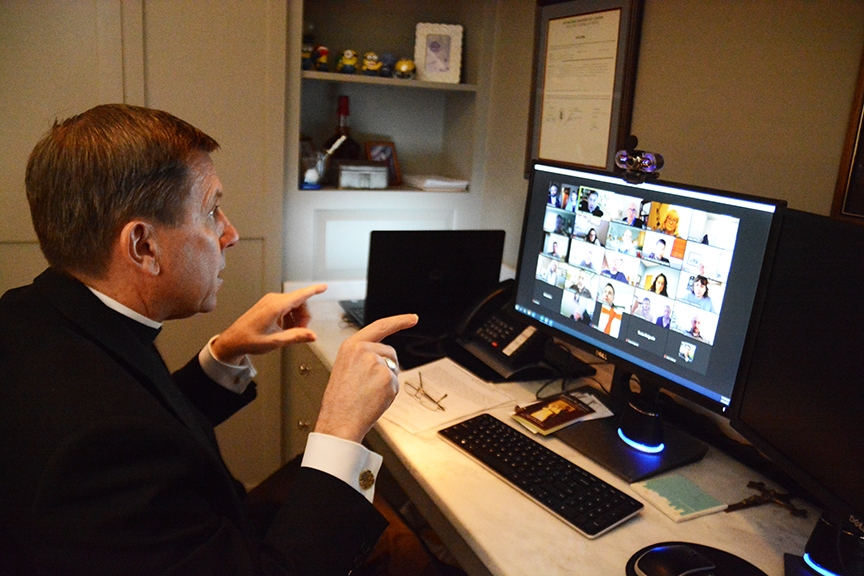
The Synod on Synodality is beginning to roll out across the Diocese of Nashville.
Several listening sessions for people to discuss the themes of the synod – communion, participation and mission – have already been held at churches in the diocese and many more are planned.
On Wednesday, Feb. 9, the two co-contacts for the synod in the diocese, Dr. Brad Peper, the director of the diocesan Office of Faith Formation, and Erin Stracener, director of the diocesan Tribunal, who are overseeing the synod process, held an online meeting with the people who will be facilitating the listening sessions at individual churches.
Bishop J. Mark Spalding opened the meeting with a prayer and thanked the facilitators for their willingness to be part of this worldwide effort.
Pope Francis has called on every diocese in the world to participate in the synod, which will culminate with a Synod of Bishops on Synodality to be held at the Vatican in October 2023.
Vatican documents about the synod define synodality as “a way of being by which the Church lives out her mission in dialogue with the living voice of the People of God and in openness to the guidance of the Holy Spirit.”
There are three steps in the synod. The first is at the diocesan level. In the United States, each diocese will compile the comments made at various listening sessions into a 10-page synthesis that will be forwarded to the U.S. Conference of Catholic Bishops, which will use them to prepare a document to forward to Vatican officials organizing the gathering of bishops in 2023.
The listening sessions provide a chance for the people in the pews to be heard on issues such as:
- How can the Church live out its Christian faith?
- How can the local Catholic community foster a Spirit-filled sense of belonging among the laity, new members and visitors?
- How can the local Church encourage participation in the life of the Church by the laity, by young adults, and by youth?
- How can local Catholic communities equip parents with the knowledge and tools to pass on the faith?
- How is the local Church reaching people on the margins of society?
- How does the local Catholic community foster the faith with active Catholics and engage with fallen away Catholics, people of other denominations or religions, and those with no religious affiliation.
The facilitators in each church have been provided suggested questions, but they can adjust them to better fit the group assembled for each listening session, Peper told the facilitators.
The job of the facilitator is to give people an opportunity to express themselves, Peper and Stracener said. “It’s really to listen,” Peper said. “It’s about being able to express their genuine responses to these issues.”
They suggested organizing listening sessions with existing groups within a parish, such as a religious education class, or Bible study groups. They also suggested scheduling listening sessions at different times and in different places to make it convenient for a wide variety of people to attend one.
“Part of this is to hear from people who aren’t typically heard,” Stracener said.
Although the listening sessions are being held to collect comments that can be forwarded to the diocesan, national and Vatican levels, Peper said, facilitators may hear comments that spark ideas that can be implemented at their parishes or at the diocesan level. “The idea is how can we start to listen better to affect these things and to help the Catholic Church grow,” he said.
St. Martha Church in Ashland City scheduled three listening sessions, having held two with the third upcoming.
The first listening session, held on Feb. 5, “was a good experience,” said Robert Skipper, St. Martha’s facilitator. “I think everybody walked away not just feeling heard but feeling they could talk to each other and come to a consensus on the synod questions.”
The group’s discussion addressed some issues that the parish could address in the near future, Skipper said, including doing a better job of reaching out to people who have left the Church.
Parishioners at St. Martha asked that the notes summarizing the points they raised be made available to the whole parish, Skipper said.
“Some of this has to do with accountability,” Skipper said. “They want to see the summary and know they were understood and heard.”
The synthesis that will be prepared at the diocesan level will also be posted on the synod’s webpage on the diocese’s website: www.dioceseofnashville.com.
People who can’t attend a listening session can fill out a questionnaire available on the synod’s webpage.
For more information, visit www.dioceseofnashville.com/synod.http://www.dioceseofnashville.com.









